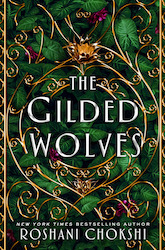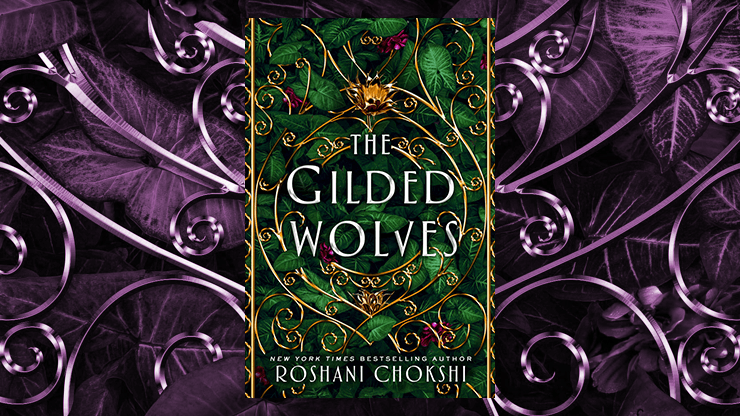In the weeks before the 1889 Paris Exposition Universelle, six teens are pulled into a dangerous heist. Séverin Montagnet-Alarie is the disowned half-French half-Algerian illegitimate son of the dead Patriarch of House Vanth. The Order, the organization that unites the Houses and formalizes the rules of Forging (aka magic), exiled Séverin years ago. He’s spent his time since “acquiring” Forged artifacts from the Order and slowly gathering his former House’s collections. Helping him are Zofia, an arson-inclined autistic Polish Jew with a flair for Forging and engineering; Enrique, a bisexual half-Spanish half Filipino historian; Tristan, Séverin’s younger brother with a plant-based Forging talent and an obsession with his pet tarantula; and Laila, an Indian girl harboring a dark secret.
When he’s approached by his former childhood companion Hypnos, a queer half-French half-Haitian Patriarch, with an offer he can’t refuse, Séverin and his crew are pulled into a vast conspiracy. To win back his status as the Patriarch of House Vanth, he and his crew must steal Forged artifacts, solve tricky riddles and complicated puzzles, and battle sinister forces all while keeping the Order off their trail. The dead will rise and the living will fall and by the end the world will never be the same.
I can’t write a review about Roshani Chokshi’s The Gilded Wolves. What’s there to say? It’s great, a marvel, lightning in a bottle. It’s an extremely well-written and tightly plotted series opener jam-packed with captivating dialogue and mesmerizing description. Not putting it at the top of your TBR pile would be a travesty. There, review done. What I really want to do is talk about the killer themes and biting critiques Chokshi delves into. No, I need to talk about them.
In Gilded Wolves, Chokshi posits a parallel universe of Western colonialism. The highlights are the same—exploitation of resources, enslavement and slaughter of Indigenous populations, the Transatlantic Slave Trade, installation of puppet rulers, and theft of cultural and religious artifacts—but she adds Forging to the list as both a resource and an artifact.
In Western societies, Forging is a weapon, a means of wielding power over another person and subjugating them to your will. Elsewhere, Forging is a tool used to honor your ancestry or for spiritual acts conducted by priests. Western civilizations invaded Indigenous societies and pried their Forged artifacts out of their cold, dead hands, turning them into weapons used against their creators.
Pre-colonialism, every culture interpreted the origin and usage of Forging differently. It is a talent that develops based on the needs of the community—for example, the Canaque (aka Kanak) in the southwest pacific have an affinity for salt water and wood. However, by the time the book opens, colonized guilds have been forced into hiding to protect what’s left of their culture. Plundering colonists regard Indigenous Forging beliefs as silly superstitions and pretty decorations, while well-meaning but condescending historians and collectors lock stolen artifacts away in museums and auction houses.
Chokshi frames all this not from the Western perspective but from that of the colonized. Laila cringes when she’s forced to entertain a bunch of French socialites with a degraded and sexualized version of a sacred dance. Zofia recoils in disgust at the Negro Village exhibit, based on the real Village Nègre at the at the Exposition that put on display over 400 Indigenous people from across the French colonies, including Kanak, Javanese, and several Arab and African tribes. Séverin himself was denied his inheritance because the French Order refused to allow two mixed race Patriarchs at the same time.
That sense of living a half life trapped between two unyielding worlds permeates the novel. All of the characters deal with a life spent constantly crossing through the liminal space between two opposing cultures. There’s a reason Séverin can own an elite hotel despite being biracial. Although his mother was Algerian, he takes after his father enough to pass as white, which affords him privileges his darker skinned friends are denied. No one understands this more than Enrique, a boy who looks too Filipino for the Spanish to take him seriously and too Spanish for his Filipino countrymen to see him as one of them. Unlike Séverin, his physical features are such that he cannot set aside one people for another. He will always be both, a fact which makes him the Other. He is neither and both at the same time. Or, as Hypnos so aptly puts it, being a French Patriarch means he “cannot be both the descendant of a slave and the son of a French aristocrat, even if that is what I hold in my heart.”
Buy the Book


The Gilded Wolves
But what makes this sextet so remarkable is that no matter where on the spectrums of the various socio-cultural identities each of them lie, they all accept each other for exactly who they are rather than who the world insists they become. Zofia is the perfect example of this. Even though the word “autistic” is never used, she appears to be somewhere on the spectrum. While sometimes she’s confused by how she’s different from other people, she never sees those differences as determining her value. And, crucially, neither does anyone else. Her crew understand she has her own way of processing things and they’ve adapted their behavior to make her more comfortable. Her behavioral differences are respected rather than being targeted or tokenized.
In many ways Gilded Wolves reminds me of another book I fell hard and fast for last year: Heidi Heilig’s For a Muse of Fire. Both take young adult fantasy to the next level by exploring race, racism, and disability by deconstructing colonialism. And both subvert old, tired tropes by adding new characters and cultural attitudes to the mix. I adore this new trend of anti-colonialist YA and hope it continues forever and ever.
I can’t say enough how incredible Gilded Wolves is. What Roshani Chokshi has accomplished here is nothing short of a miracle. I’m a little embarrassed to say that this was the first book by Chokshi I’d ever read, but I am now a fan for life. I am IN LOVE with this novel, with these characters, with the scathing subtext. If the rest of this series is even half as good as the first, we’re in for a helluva ride.
Gilded Wolves is available from St. Martin’s Press.
Listen to an excerpt from the audiobook.
Alex Brown is a high school librarian by day, local historian by night, author and writer by passion, and an ace/aro Black woman all the time. Keep up with her every move on Twitter and Insta, or follow along with her reading adventures on her blog.










